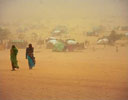
There is no doubt: today is all about Sudanese President Omar al-Bashir, his International Criminal Court arrest warrant, and the future of peace and justice in Sudan.
But just across the border from Darfur, there is another festering situation involving large numbers of refugees and internally displaced people, not to mention myriad rebel factions, armed bandits, and a United Nations-backed joint peacekeeping force. There is also a predatory government in that country’s capital, which is using its substantial oil revenues to arm itself to fight an armed insurgency in a peripheral region of the country—in this case the East.
This “guess the country?” challenge is not nearly as difficult as Wronging Rights’ recent “guess the conflict?” quiz. The country in question here is, of course, Chad, where a European Union-supported U.N. peacekeeping mission will transition to a fully United Nations-backed mission in less than two weeks. (That’s EUFOR to MINURCAT, for those new to the alphabet soup that is peacekeeping operations in Chad).
As my colleague Omer Ismail and I argued last fall, Chad’s internal problems are troubling in their own right. Chad’s instability will not be resolved without a hard look at a man who the Economist called the “main author of his own misfortunes:” President Idriss Déby. (This distinction from the Economist came a year ago following Sudan-backed Chadian rebel coup attempt numéro deux.)
President Déby is also largely responsible for the suffering of his nation’s ten million citizens. And while today, the President may be in his palace in N’djamena quietly registering a victory against his nemesis-erstwhile-co-conspirator Sudanese President al-Bashir, he should be well aware that his own regime’s consistent record of human rights abuses could result in him someday winding up in the same place as Bashir: on trial at the Hague.
N.B.: If you have some time on your hands, check out the State Department’s recently released annual Human Rights Report, and if you are in the mood to be particularly depressed, read the chapter on Chad (PDF).
N.B. numéro deux: Who would have guessed, Khartoum and Ndjamena are at each other’s throats once more, despite their pomp and circumstance of renewing diplomatic relations last November. After the Chad-Sudan Contact Group postponed its ministerial meeting scheduled for February 27 in Khartoum, African Union chairman Jean Ping expressed his concern over the two countries’ fraying relations. It is understandable that the meeting would be postponed. After all, in addition to the news of the ICC warrant, both nations have been quite busy of late arming their proxy militias and slinging accusations at each other.

